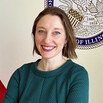Yale Environmental Protection Clinic Makes Impact in 2014–2015
The Yale Environmental Protection Clinic, a collaboration of the Law School and the School of Forestry & Environmental Studies (FES), undertook a number of projects this year to further its mission to address environmental law and policy problems.
Clinic students Lee Miller ’16 and Kat Loomis ’16 worked with the Natural Resources Defense Council on transparency in industrial agriculture. The clinic has previously worked with the NRDC for more than a year, and these students will continue their association in the 2015–2016 academic year. The team completed a database of the location, size, and type of industrial agriculture facilities across the United States. The team also developed a model regulation for states to control the impacts of industrial agriculture.
Leslie Couvillion ’15 worked with the Environmental Protection Agency’s Office of Environmental Justice to develop a “Compendium of Terms on Environmental Justice and NEPA as Applied by Federal Agencies.” By linking environmental justice terminology with environmental review terminology, this lexicon will simplify discussions of justice issues.
Editors Gabriela Steiner and Kiran Patel asked clinic students to write chapters in International Farm Animal, Wildlife and Food Safety Law (Springer, 2016) on farm animal welfare, zoonotic disease, marine regulations and overfishing, and agrobiodiversity. Couvillion, Irina Anta ’15, Hillary Vedvig ’17, and Heather Wong ’17 contributed chapters.
Melissa Legge ’16, Becca Loomis ’16, Ashley Ingram ’17, and Tamara Thomas ’16 FES worked with an international environmental NGO to craft a letter to the Environmental Protection Agency seeking greater protection for endangered Beluga whales in Alaska.
Clinic students also worked with the Futaleufu Riverkeeper in Chile to produce a comparative analysis of the costs and incentives for non-conventional renewable power and develop a comparison of other countries’ policies to promote renewable energy in isolated regions. Due in part to the work that two clinic students presented to the New Haven Food Policy Council, the Mayor has decided to hire a city Food Systems Director.
In the 2015–2016 school year, the Clinic will begin new projects related to food and agriculture, including one that will provide legal representation to small farmers in the region. It will also work on broadening understanding around judicial remedies in environmental litigation and may develop a collaborative project on climate change communications with Paul Lussier and his course at FES “Towards Science
Communications with Impact.”
The Yale Environmental Protection Clinic covers the full range of environmental issues but houses two issue-specific programs. The program on climate change and energy addresses issues related to the science and policy of climate change, including international law, local permitting, and ocean science and policy. The program on food and farming supports clients who work for an environmentally friendly, healthy, and just food system.


